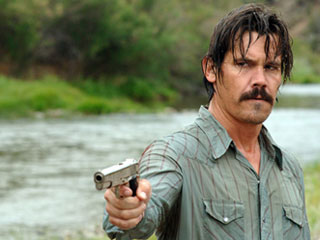Next story: Tracy Morrow & The Magi Chippie: Someday You Will Find a Home
Tightening the Net: No Country for Old Men
by M. Faust

Not counting second-run holdovers from the summer, there are by my count 27 movies showing hereabouts. Of those, taking an educated guess on the few I haven’t seen, I would say that 14 of them are worth your time. That’s more than half. And that’s a better average than I can ever remember.
This should be good news, right? Maybe not. How many movies do you, as a discerning and intelligent filmgoer, see in an average week? One or two? I do this for a living, and even I can’t keep up with the films I’d like to see. Some of these movies are doing well, but a lot are getting lost in the shuffle while assembly-line product like Bee Movie and The Game Plan dominates the box office. There’s a limited market for the good stuff, but if the investors don’t make their money back they won’t take that into account. They just assume that next time they’ll be better off investing in something like Saw Part 4 or 5 or 6.
In order words, enjoy the feast, because the famine is around the corner.
I can’t imagine that No Country for Old Men will be one of the ones that gets lost. It has a built-in audience, both as an adaptation of a novel by Cormac McCarthy and as a return to form for the Coen Brothers. If you sat through The Ladykillers or Intolerable Cruelty wishing they would get back to making movies like Blood Simple or Miller’s Crossing, you’re in luck.
Apparently filmed with great fidelity to the book (I haven’t read it), No Country for Old Men starts in a desolate area of Texas, at the scene of a drug deal gone bad. Llewelyn Moss (Josh Brolin), an unemployed electrician, is hunting with his dog when he finds the clearing with a few jeeps, a lot of dead bodies and one that’s still breathing (but just barely). One of the jeeps contains an awful lot of heroin. Moss reconnoiters the area and finds the inevitable bag of money, $2 million in nice stacks. He takes it and heads home to his wife and trailer.
What is he thinking? Obviously that $2 million will substantially improve his life. (From the looks of it, $200 would make a noticeable improvement.) Is he worried? Does he have moral qualms? We don’t know because, and this is the unusual thing for a Coen brothers movie, there’s no voiceover and very little dialogue. Whether out of respect for the source material or because the brothers figured they’d been pushing the florid dialogue to the extreme in the past decade, words here are as scarce as trees in the Texas flatlands.
The bulk of the film details Moss’s pursuit by a figure as relentless and inevitable as a masked stalker in a slasher movie. We learn at one point that his name is Anton Chigurh, and he is played with a haircut so odd that I didn’t recognize him to be Javier Bardem. He has a novel way of killing people; I’m not sure if I found it plausible, but it’s certainly a change from the endless gunplay you usually see in a crime film. (It helps keep the volume down too—there’s even less music than words, which makes for an eerily quiet movie.)
He also has a personal code. Or maybe he’s simply insane; either way, he has a set of rules under which he operates, and he never deviates. If someone is in his way, he kills them. If they merely irritate them, he’s prone to give them a chance with the toss of a coin.
No Country for Old Men is so impeccably crafted that it’s the first Coen brothers film that reminded me of Hitchcock. They take their time with details, some of which may only make sense to viewers who have read the novel. (Or does everyone take off their boots and socks before searching a motel room in which he has just killed three people?) I don’t think any of it is arbitrary, though: Every detail of Moss’s escape plan, and every detail of Chigurh’s pursuit, works like a thread in a web of fatalism that grows increasingly tight.
In an interview elsewhere this issue, Stephen King talks about how his mother despised what she called “Hitchcock endings,” movies that lacked a clear resolution. Mrs. King would not have liked this film. I will say no more but this: As the sheriff in the country where this story begins, Tommy Lee Jones disappears from the film for long stretches. But he is nonetheless the central character, and you’d be advised to pay attention to him.
|
Issue Navigation> Issue Index > v6n47: Lackawanna Soccer Blues (11/21/07) > Film Reviews > Tightening the Net: No Country for Old Men This Week's Issue • Artvoice Daily • Artvoice TV • Events Calendar • Classifieds |









 Current Issue
Current Issue